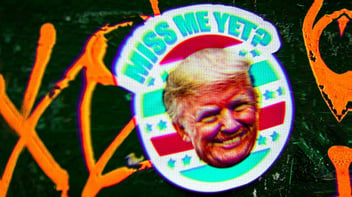The Violent States of America.
 Image Description: Neon green toy soldiers lined up, pointing their guns ahead.
Image Description: Neon green toy soldiers lined up, pointing their guns ahead.
Most politically aware people are familiar with Dwight Eisenhower’s farewell address when he cautioned against the terrifying new accumulated strength of American armed forces and the “Military Industrial Complex.” Never mind that he directly oversaw the dramatic assembly of a nuclear arsenal that would set the pace for the arms race or was the first president to direct the CIA to undertake covert operations that overthrew the democratically elected leaders of both Iran and Guatemala. These are just details.
Do as I say, not as I do.
In many ways, Eisenhower was setting the stage for how the U.S. would operate ever since. Two of the most blissfully ignorant American characteristics are selective amnesia and the insistence that we are a force for good in the world. We’re a nation that truly believes that war spreads peace, which is why we call soldiers ‘peacekeeping’ troops and not merchants of death. We believe that if a tiny nation in Southeast Asia elects a socialist, then an invasion on U.S. soil is imminent. And that democracy is something you can force on a people, not something a people must choose. In other words, the opposite of democracy.
Are we just stupid? You bet. Just kidding. Not really. But we have a rather high and misplaced opinion of ourselves and our role in the world. So today we’re unf*cking U.S. interventions abroad and illustrating how the United States is the most violent nation ever conceived.
In recent news, Luis Arce of the socialist party in Bolivia won election in 2020. I know what you’re thinking. That’s amazing! So happy for him. Or, if you’re the corporate media and most people who watch it, you’re thinking, “Who gives a shit?” and “Where the fuck is Bolivia?”
If you really weren’t aware, I’m not blaming you, but this is a terrific jumping off point to explain our modus operandi in the world and the most recent example of U.S. intervention in foreign affairs. You see, there was a coup of sorts in Bolivia in 2019. Evo Morales, Bolivia’s first indigenous president and a socialist, was ousted after an election where his opponent claimed fraud. In the interim—and stop me if you’ve heard this one before—a far right wing Christian woman with a history of anti-indigenous statements named Jeanine Añez was installed and Morales was exiled. And it was the U.S. who backed the efforts of the opposition and promoted the narrative of fraud in the elections, despite there being no evidence.
As you’ll learn in this essay, this is like a glass of diet intervention for the U.S. And another example of the fucking ineptitude of the Trump administration. Former presidents be like, “hold my beer.”
Our recent fuckery in Bolivia is only remarkable for its lack of visible violence. We’re usually far more ruthless and effective. It’s no secret that we went on quite the tear after World War Two. We were trying on our new persona of awakened giant and starting to flex in various parts of the world. Our military apparatus was fully operational and we were on a coke high. The only problem was, so was the Soviet Empire. So the big dick contest was in full swing, and in the years following World War Two we started fucking around. First in Korea, then Lebanon, Cuba and Vietnam.
These wars and actions are really well documented because they were fought out in the open. Americans were in full support of pretty much everything the government did. We believed so wholeheartedly that Soviets were about to invade the country, nuclear war was imminent and that the media and government were honest, there was little if any reason to doubt our intentions. For our purposes today, however, we’re going to focus on how our methods and ideology changed in the post-Vietnam War era.
To that extent, let’s begin by dispelling the mythology around the holier-than-thou Boomers and the idea that the anti-war left was partially responsible for bringing down Nixon. Nixon was reelected by the largest popular vote margin in history while the war was still raging. It was the Watergate scandal that took Nixon down because we had real institutions that provided for separation of powers back then.
As far as protests being responsible for our withdrawal, most Americans supported our efforts abroad right up to the bitter end. Understand that mass anti-war protests stopped when we got rid of the draft. So don’t let your Boomer uncle who protested Vietnam but supported the next 25 U.S. invasions abroad claim any moral high ground.
And no, I’m not suggesting protest is ineffective. To the contrary, I believe it to be the single most effective form of political expression afforded to us in this nation. It got us the Voting Rights Act, universal suffrage, helped curb the proliferation of nuclear weapons, 40 hour work weeks and weekends, protection for child labor, and so on. And in the case of Vietnam, it certainly played a role in making the establishment uncomfortable and a little more accountable. But the nagging fact remains that the U.S. still secretly bombed Laos and Cambodia, openly lied about our activities in Vietnam and the war spanned three presidents. Three.
In reality, the American people were turning inward and quickly losing interest in wars abroad. The recession from 1973–1975 was the first real period of economic punishment post World War Two that hit every American square in the pocketbook. The one-two punch of the draft ending and the economy tanking meant Americans no longer gave a shit what was happening on some island they’d never heard of before we invaded. With journalists like Seymour Hersh uncovering U.S. atrocities such as the Mỹ Lai massacre and revelations from the Pentagon Papers helping unravel the government narrative, the war culture on both sides suddenly fell out of fashion and favor.
It took protest, fearless journalism, a recession and the end of conscription to get us out of Vietnam. Oh, and we fucking lost.
In the 1970s, the U.S. turned the page and closed the chapter on the Red Scare. While the Cold War would persist for another decade, with the Soviet Union being our chief foe, strange bedfellows in America began to write the new playbook. One that would be followed for the next half century.
Under the premise that war is good for the economy, these interests coalesced around a new concept of militarization and interventions abroad. The private sector, higher education, the Christian right and an extreme hawkish wing of the government would form a marriage of convenience to birth a radical new philosophy that has endured ever since.
Big banks and big oil were determined to keep a seat at the table while the economic theories from the Chicago school of economics promoted a highly punitive global agenda. The Christian right under the leadership of Doug Coe and Chuck Colson began to exert foreign policy influence under the ‘doctrine of prosperity’ that absolved Americans of the sin of plundering. The heirs to Nixon and Kissinger’s thrones would seize the levers of power within the government, and we began the steady march toward the privatization of the U.S. military, culminating today in the most powerful mercenary force the world has ever seen. (Hint: it’s run by Betsy DeVos’ brother.)
You see, what every one of these constituencies recognized was the need to control access to natural resources and cheap labor. Corporations expressed their desires to pillage the world, the Chicago school created the economic roadmap to sacrifice the American worker in service of corporate interests, the government provided the policy rationale and cover, and the Christian right forgave them their trespasses under the burgeoning doctrine of prosperity and Jesus as capitalist.
Basically, Friedrich Hayek and Milton Friedman gangbanged Ayn Rand while Kissinger jerked off in the corner and Doug Coe blessed the orgy. Too far? Sorry, not sorry. If you’re one of the millions of innocents slaughtered abroad or one of the 30 million Americans who lives in poverty today as a result of these assholes, then it’s not far enough. But I digress.
The given name for this philosophy is neoliberalism, and it is our guiding light as a nation. It sounds like a wonky and bassackwards word to those who haven’t heard it, but neoliberalism is essentially the marriage of economic theory, militarization and imperialism under the banner of spreading democracy through Christ. In service of the entire affair, Hollywood and the media would create the packaging that smoothed over any rough patches and made us feel better about our show of strength.
We should address how exactly one goes about bombing another country without permission, because there used to be rules to this shit. One of the things that drives me nuts is when people casually refer to the president as the Commander in Chief. That’s a designation specifically intended to confer the power to direct U.S. military forces only after a declaration of war by Congress, powers specifically granted in Article One, Section Eight of the Constitution.
In 1973, after Kennedy, Johnson and Nixon all played fast and loose with war powers, Congress attempted to rein in the executive branch by passing the War Powers Resolution. This would grant a president temporary authority to commit troops, but this authority would have to be renewed every 60 days by Congress. To call this attempt dead on arrival would be kind, as every president since then took a steaming dump on these rules and carried out military actions, both covert and in plain sight, with impunity. Presidents have claimed the broadest interpretation of emergency powers possible to carry out acts of aggression against a surprising number of nations.
Officially, we like to claim that, apart from the Cold War, the only official wars the U.S. has taken part in since the second world war are Korea, Vietnam, the Gulf War, Bosnia, Afghanistan and Iraq. By any reasonable standard, these would be quite enough. But if we open our minds to define war, this is just the tip of the iceberg.
Let’s put it this way: if any of the following scenarios were to happen with the United States as the victim, we would consider them an act of war:
-
If we were bombed.
-
If a political or military figure was assassinated or attempts were made.
-
If insurgents in the United States were given weapons, training and funds to overthrow the U.S. government.
So first, let’s agree that if someone, anyone did one or all of these things to us, we would fuck them up beyond repair. Agreed? Good. Because by my count, if we eliminate the wars we admit to, we’ve still bombed, overthrown or attempted to assassinate leaders in Laos, Cambodia, Lebanon, Syria, Grenada, Haiti, Cuba, Chile, Panama, Nicaragua, El Salvador, Iran, Guatemala, Bolivia, Venezuela, Pakistan, Somalia, Sudan, Indonesia and Yemen.
You ready for the answer? To find out how we can do all these things without declarations of war? Drum roll please…
Because. Just, because.
Every president has essentially engaged in unconstitutional behavior and made an end run around Congress and international law. We get away with it simply because we can and there are no powers strong enough to stop us.
This brings us to the last part of the equation: Why we as patriots who see ourselves as the good guy in the world go along for the ride and appear to give zero fucks about what we do elsewhere.
Ever see A Few Good Men? Be honest and ask yourself, who did you root for? Nicholson or Cruise? The answer will tell you a lot about how you’ll feel about this topic. Here’s why neoliberalism is hard to argue with and has been the way of our world for so long. We’re programmed to win. And that’s not an exclusively American trait. Blood thirsty competition among nations existed long before the United States was an idea. We just currently embody it.
But every culture or nation state in history has had its moment reaching for the sun, and every single one has fallen like Icarus. It’s a matter of time and hubris. But for now, we’re the ones on top and making the most of our position in history. We’re in first place, particularly if your measure of success is the accumulation of other people’s stuff.
We love winners. We love beating people and taking their shit. Kill Arabs, take their oil. Kill Africans, take their precious metals. Kill Asians, take their rubber and exploit their labor. Whatever it is that we think we need, we take it. We move on countries like a bitch. We don’t even ask permission. And when you’re famous, they just let you.
We like to paint Hollywood as filled with lefty pinko commie bleeding heart elitists, but Hollywood is very much a part of the U.S. war propaganda machine, normalizing our activities abroad even while criticizing them. They’ve mastered the art of appearing critical of our actions while making heroes and martyrs of our troops. Even when they’re pointing out the dastardly minds behind our bloody policies, Hollywood spends precious little celluloid depicting the outright massacre and horrors we inflict on our mostly imaginary adversaries. Blockbusters have a way of convincing you to root for the antihero. Nicholson over Cruise.
Did Bud Fox emerge as the hero of Wall Street or did Gordon Geckko?
Think about how much effort goes into assuaging our guilt over foreign wars and painting the victims as the enemy. The plot lines are all pretty straightforward. We bomb and invade a country. Get totally entangled. Then, so-called insurgents in that country fight back. Something tragic happens. We make a movie about how tragic it was and how heroic we were for braving it. That’s pretty fucked up. It’s the reverse of Red Dawn, which captured our imaginations at the height of the Cold War. But the narratives of movies like Black Hawk Down, American Sniper, Lone Survivor and Zero Dark Thirty all follow the reverse image script of Red Dawn without us even realizing it.
And yet through it all, we still see ourselves, believe it or not, as the underdogs.
Here’s how I look at the past five decades:
-
The '70s, we started testing out new ways to fuck with people. It was the experimental decade. Regime change here, sanctions there. We straight up assassinated Salvador Allende in Chile for example. Sending lawyers, guns and money to one region and outright bombing another.
-
The '80s, we went from hammer and fist to sanctions and ledgers. Wall Street and economists got involved and shit got complicated. Greed is good and drugs are bad. Put the two together and you can finance illegal arms, destabilize entire regions and overthrow regimes without firing a shot.
-
The '90s, was a Hollywood makeover in the Clinton years. The Democrats and Republicans became indistinguishable from one another as we shipped out our jobs and enslaved working people in foreign nations. Jesus takes the wheel as the face of American capitalism. The globalization era officially begins and the Chicago School is fully in charge.
-
In the 2000s, we officially stopped asking for permission and the Bush Doctrine became the law of the land. Combining the use of force with economic hegemony was the name of the game. The new rule of international law was more pre-crime, Minority Report shit than treaties, international agreements and norms. If we even thought you had a bad thought about us or were hiding something we wanted, we were coming to get it.
-
The 2010s, we hired a PR firm, got on message and corporatized the process. The U.S. was in business, with everyone pulling the oars in the same direction. A smooth president, corporate America, corporate media, Wall Street, lobbyists, think tanks, Congress, Hollywood, you name it. Complete and total alignment with corporate precision and execution by drone. And for good measure, we brought in experts from the tech sector to help us fight our battles on the new information frontier.
Now in the 2020s, the only logical direction is for Skynet to gain consciousness and fucking end this stupid experiment of ours.
Thank God we don’t elect crazy people with access to nuclear codes.
“I would bomb the shit out of them.” - Donald J. Trump, 45th President of the United States
The proposition behind Unf*cking the Republic should not only be to shine a light on the ugly aspects of the American experiment. Context, honesty and introspection are required if we’re to determine what happens next. Solutions must be given, or this is just one big complaint. In the case of our militarism, the solutions we seek are right in front of us.
As we established in our essay, Priorities: War, Wealth and Welfare, our military budget is north of $700 billon annually. We operate more than 800 active bases worldwide that cost between $80–$100 billion per year to maintain. We’re currently still at war in Afghanistan, the longest running war in our little history, with more than 14,000 troops still deployed. And while the Iraq War came to an official conclusion, we still maintain 5,000 troops on the ground.
According to the Associated Press, these aren’t the only places we’ve tucked away our troops abroad. The AP reports that we have 2,500 in Turkey, 800 in Syria, 3,000 in Jordan, 13,000 in Kuwait, 5,000 in the United Arab Emirates, 10,000 in Qatar, 7,000 in Bahrain and 3,000 in Saudi Arabia.
We’ve fought wars to obtain natural resources that could otherwise have been acquired through productive trade agreements. The Chicago school theories that promoted nefarious activities in service of increasing corporate wealth are finally being seen for what they are: an attempt to enrich the few on the backs of the many. With so many Americans still living in squalor and inequality reaching preposterous heights, it’s time to recalibrate our economic lens and view capital differently.
Imagine if the resources committed to interventions, maintaining a physical military presence in countries around the world—in the age of information no less—were redeployed domestically.
Imagine accessing the talent of our highly capable and trained military to facilitate infrastructure projects at home.
Imagine pouring hundreds of billions of dollars into our systems of education and healthcare instead of ventilating the corpse of an anachronistic and belligerent system.
Imagine increasing the spending power of consumers by empowering them with living wages.
The wars we fought for fossil resources have no place in a global economy surging toward renewable energy. In the most pragmatic of terms, our outdated economic and military strategies are ironically constricting our ability to shape the new reality that is in many ways already upon us. When people like Congresswoman Ocasio-Cortez and Senator Bernie Sanders talk about a Green New Deal, they’re not simply proposing measures that would bankrupt the nation and put industries out of business.
We feel no empathy today for the railroad industry that shunned new forms of transportation. So why should we feel empathy for mega fossil fuel corporations whose heads are so far in the ground looking for oil that they can’t see the sun?
Why would we disrupt a neighboring nation’s election process if it tilted toward socialism? Canada is socialist, and they’re one of our largest trading partners. What the fuck is our obsession with preventing other countries from helping their own people while we simultaneously ignore the poverty, hunger and homelessness in our own? I’m not suggesting a return to isolationism. To the contrary; this is the time to seize upon economic opportunities that are already presenting themselves and to invest in a population at home that is hungry for leadership, new skills and a brighter future with clean air, potable water and access to healthcare.
This is the one time we need to tap into our selective amnesia and forget our militant ways. A new economy is coming and neoliberalism is dead. One that requires fewer natural resources to compete. We don’t have to steal everyone’s shit. There’s no shame in paying for it, getting what we need and helping to promote prosperity in other parts of the world. A prosperous and equitable world is one that transacts freely, innovates rapidly and rises together.
Not to mention, wouldn’t it feel great to finally be the good guys again?
In short America, Be Best.
I’ll leave the final word to the great historian Howard Zinn who offered this reflection on Athens:
“A nation may be relatively liberal at home and yet totally ruthless abroad. Indeed, it may more easily enlist its population in cruelty to others by pointing to the advantages at home. An entire nation is made into mercenaries, being paid with a bit of democracy at home for participating in the destruction of life abroad.”
Here endeth the lesson.
Max is a political commentator and essayist who focuses on the intersection of American socioeconomic theory and politics in the modern era. He is the publisher of UNFTR Media and host of the popular Unf*cking the Republic® podcast and YouTube channel. Prior to founding UNFTR, Max spent fifteen years as a publisher and columnist in the alternative newsweekly industry and a decade in terrestrial radio. Max is also a regular contributor to the MeidasTouch Network where he covers the U.S. economy.


